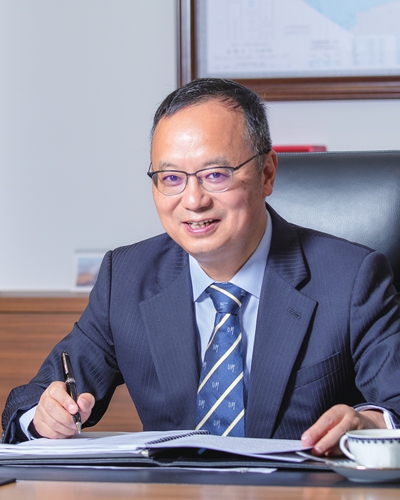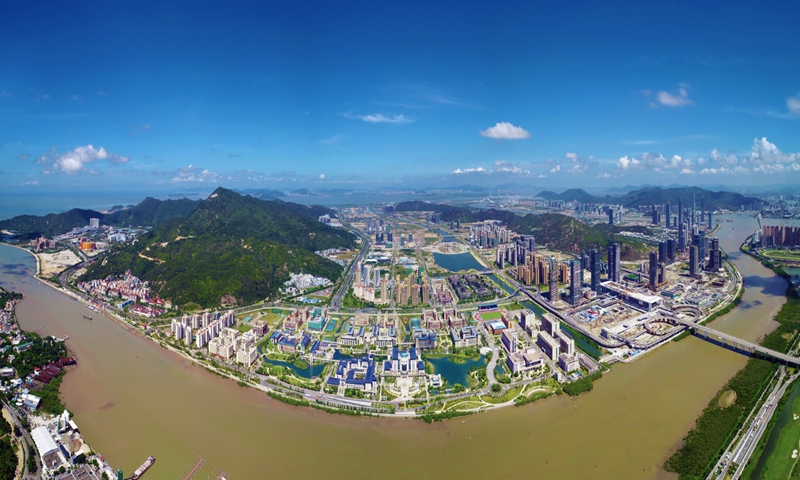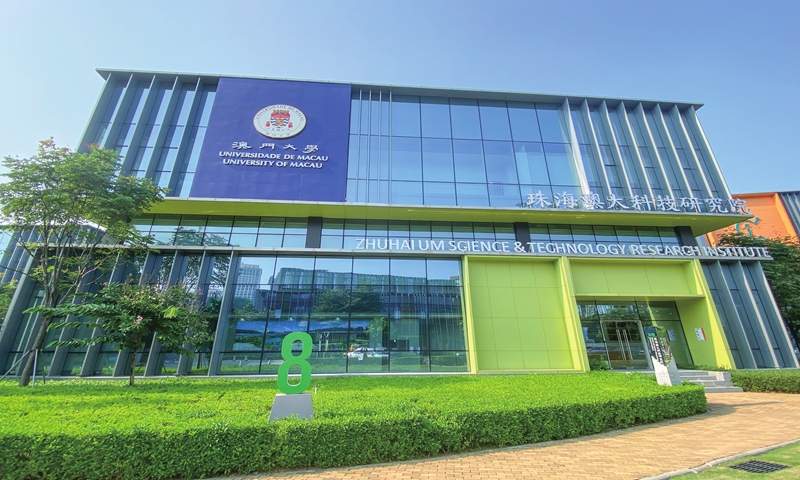
Song Yonghua, rector of the University of Macau Photo: Courtesy of the University of Macau
In his second exclusive interview with the Global Times, weeks after a grand plan for building a Guangdong-Macao in-depth cooperation zone was unveiled, Song Yonghua, the rector of the University of Macau (UM), was thrilled at the prospect of UM - a poster child of the practice of "one country, two systems" - embracing yet another momentous upgrade as Macao is on pace to become a more prominent component of a closed loop system emanating China's economic prowess both onshore and offshore.
As the only public comprehensive university in the special administrative region (SAR) that received multiple mentions in the wide-ranging plan, UM has shot to global fame over the past decade since the Standing Committee of the National People's Congress, the country's top legislature, approved a bill in June 2009 which authorizes Macao SAR to exercise jurisdiction over the university's new campus on the Hengqin Island after it became available for use.
The groundbreaking ceremony for UM's 1.09-square-kilometer campus on the island south of Zhuhai, South China's Guangdong Province, roughly 20 times larger than its Macao campus, took place on 20 December 2009, which marked the 10th anniversary of Macao's return to the motherland. The campus was inaugurated in November 2013, and the university's relocation to the campus in 2014 apparently injected new impetus into Macao's higher education system.

The campus of the University of Macau on the Hengqin Island Photo: Courtesy of University of Macau
Along with the spacious expansion comes the university's climb up the ladder in terms of nurturing talent, high-tech innovations and the translation of research results into commercial successes, according to Song, who also acts as an advisor to the Science and Technology Committee of the Macao SAR government.
UM is ranked 201-250th in the Times Higher Education World University Rankings. It currently takes the 38th spot in the Asia University Rankings and is fifth ranked globally as measured by international outlook.
These numbers were beyond imagination a decade or even five years ago, Song said, attributing the university's meteoric rise to its relocation under the framework of the "one country, two systems" policy.
Breakthroughs anticipated
In a significant evolutionary step after the courageous attempt to bring UM's Hengqin campus under the jurisdiction of Macao SAR, the plan for building an innovation-oriented testing ground linking Macao with its next-door neighbor, Hengqin Island, was announced in early September, pioneering a joint governance structure in which Macao SAR chief executive and Guangdong provincial governor will co-head a management committee.
The innovative governance design arguably fleshes out the practice of one country and two systems, allowing for mutual discussion, joint construction and administration, as well as shared benefits by Macao and Guangdong across the in-depth cooperation zone, Song remarked, envisioning deregulation of flows of people, goods and data throughout the zone.
According to the plan, the in-depth cooperation zone in Hengqin that spans 106 square kilometers, more than three times the land area of Macao, is expected to institute a two-line customs infrastructure for goods and data exchanges in 2022, with the area lying between Hengqin and Macao assigned as the first-line subzone while the area sitting between Hengqin and other areas with China's customers territory falls under the second-line.
As courageous innovations are being advocated over the course of the zone's development throughout 2035, a bold idea was taking shape in Song's mind.
The university's Hengqin campus, situated in the first-line zone, is now accessible via an underwater tunnel without going through immigration clearance. This, nonetheless, means a detour that requires transfers between buses or cabs for UM students and faculty members to cross the Zhuhai-Macao border, even though the campus' fencing, part of the borderline demarcating Macao from the mainland, is only some 100 meters away from the Hengqin Port.
In years to come, it is conceivable that a five-minute walk would be sufficient to leave the campus for Zhuhai, Song estimated, factoring in the possibility of facial recognition, among other smart means, to pass through immigration checkpoints.
With the zone in Hengqin intended to create a new ecosystem highlighting its integration into Macao with higher-level openness, cross-border data flows in a safe and orderly manner, a growing contributor to security-sensitive economic growth amid geopolitical uncertainties, have come into focus. As the plan suggests, universities and research institutions in Zhuhai and Macao will be supported to achieve scientific research data cross-border interconnection on the premise of ensuring the security of individual information and important data.

Zhuhai UM Science & Technology Research Institute on the Hengqin Island Photo: Li Qiaoyi/GT
In the case of UM, other than its Hengqin campus, the Zhuhai UM Science & Technology Research Institute on Hengqin Island, located within the second-line subzone, remains subject to different rules when it comes to cross-border data flows and internet management including access to foreign websites, Song said.
It still needs to be crystallized as to "how open the [in-depth cooperation zone] would become," thus facilitating the zone's progress in international scientific and research cooperation, Song noted, urging concrete moves in the pipeline to get the zone ready in legal, technological and financial terms.
Emerging economic footprintWith the 2009 bill that heralded the iconic university's rise to prominence over the years, the plan for building the in-depth cooperation zone is thought to be preluding Macao's takeoff as a genuinely diversified economy so as to contribute to the country's dual-circulation economic strategy in which Hong Kong and Macao will supposedly play a vital part.
The zone, essentially designed to diversify Macao's economy away from a historical reliance on the gaming sector, seeks to integrate Macao's expertise into the development of the Greater Bay Area, Song stated, citing UM's advantages in multiple disciplines as potentially an accelerator for the diversification push.
UM, currently hosting three of the four state key laboratories in Macao, is known notably for its
chip powerfulness. The number of papers - literally ground-breaking chip designs -UM unveiled at the International Solid-State Circuits Conference, a flagship industry forum known as the "Chip Olympics," has over the past decade outstripped any other Chinese research institute.
During the
previous interview with the Global Times in late 2019 when Macao was celebrating the 20th anniversary of its return, Song was bullish about Macao's rising profile in the country's indigenous chip drive.
In a sign that chip advances might turn out to be an emerging economic anchor, mirroring the country's tech self-sufficiency at large, Digifluidic Biotech, a health tech start-up incubated at UM known for "Virus Hunter," a digital microfluidic chip-based rapid test kit, has swiftly expanded since its founding in 2018.
The start-up, initially occupying an office space of about 200 square meters, moved to a 2,500-plus-square-meter three-story building just a dozen meters apart from UM's Zhuhai research institute in late September.
It is hoped that a second round of funding could be closed before the year end, Chen Tianlan, founder and CEO of Digifluidic Biotech and a PhD graduate of UM, told the Global Times at the firm's new office building that's still being furnished.
The UM offshoot is apparently aiming high, just as the university, a showpiece of Macao's growing closeness to the mainland far beyond academic, is readying itself for an epoch-making moment until when the two SARs alongside a constellation of mainland cities are adequately sophisticated to underpin the country's rise as a modern socialist power in both economic and technological terms.






